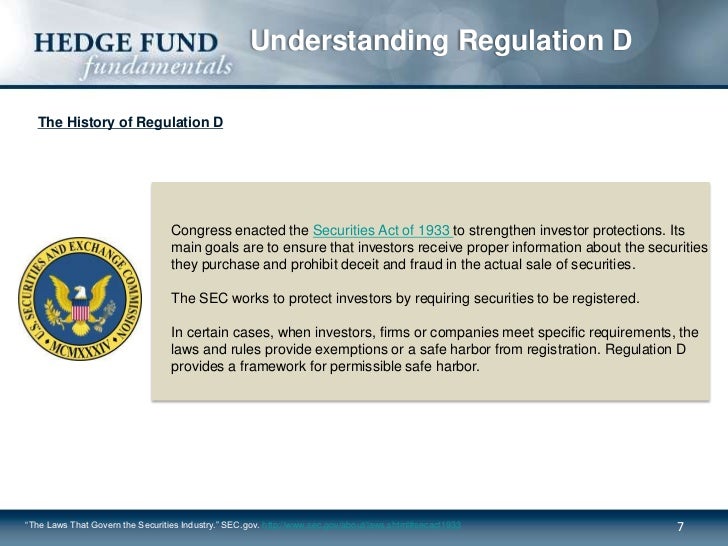Regulation D General Solicitation
Regulation D General Solicitation is an important aspect of the securities market that allows companies to raise capital through public offerings. This regulation was recently amended by the SEC to permit general solicitation, opening up new avenues for companies to reach potential investors. In this article, we will explore the latest updates on Regulation D and its impact on the securities industry.
1. Understanding Regulation D General Solicitation

Regulation D General Solicitation refers to a provision under Rule 506(c) of the JOBS Act that allows companies to publicly advertise and solicit funding from potential investors. This means that previously restricted private offerings can now be marketed to a wider pool of investors, including the general public. It provides companies with increased opportunities to raise capital and attract investors who were previously unreachable.
2. Latest Updates on Title II JOBS Act and Regulation D

The JOBS Act, passed in 2012, introduced several regulatory changes to facilitate capital raising for businesses. Title II of the JOBS Act is particularly relevant to Regulation D and has brought significant updates to the securities market. Rule 506(c) under Title II allows companies to conduct general solicitation under Regulation D, provided they take reasonable steps to verify the accredited investor status of investors.
3. Benefits of Regulation D General Solicitation
Regulation D General Solicitation offers several advantages to both companies and investors. Let's explore some of the key benefits:
- Access to a wider investor pool: By publicly advertising their offerings, companies can reach a larger audience, including potential investors who might not have been aware of their private offerings previously.
- Enhanced capital raising opportunities: The ability to solicit investments from the general public allows companies to attract a broader range of investors, potentially leading to increased funding for their business.
- Increased market exposure: General solicitation can help companies create brand awareness and gain market exposure, which can be beneficial in attracting potential partners, customers, and investors.
Frequently Asked Questions (FAQs)
Here are some frequently asked questions about Regulation D General Solicitation:
Q: Are there any limitations on who can invest under Regulation D General Solicitation?
A: Yes, investors need to meet certain criteria to participate. Companies relying on Rule 506(c) must take reasonable steps to verify that investors are accredited investors, i.e., individuals with sufficient net worth or income. This helps ensure that only qualified investors participate in the offerings.
Q: What are the reporting requirements for companies using Regulation D General Solicitation?
A: While companies can publicly solicit investments under Regulation D, they are still required to file a Form D with the SEC. This form provides essential details about the offering and helps regulators track the activities of companies conducting public offerings.
Q: How does Regulation D General Solicitation impact investor protection?
A: While Regulation D General Solicitation expands the reach of private offerings, it also imposes certain requirements to protect investors. By mandating reasonable steps for verifying investor accreditation, the SEC aims to safeguard investors from potential fraudulent schemes and ensure they have access to necessary information about the offering.
Q: Can companies advertise their private offerings on any platform?
A: Companies can advertise their private offerings on various platforms, including websites, social media, and traditional media channels. However, it is important to comply with the advertising rules outlined by the SEC to avoid any legal implications.
Q: Are there any specific guidelines for companies engaging in Regulation D General Solicitation?
A: Yes, companies must be diligent in complying with the rules and regulations governing Regulation D General Solicitation. They must take reasonable steps to verify investor accreditation, ensure accurate and non-deceptive advertising, and file the necessary forms and disclosures with the SEC.
In conclusion, Regulation D General Solicitation has transformed the securities industry, providing companies with new avenues to raise capital and reach a broader investor base. With the latest updates on Title II JOBS Act and Rule 506(c), the possibilities for companies seeking funding have expanded significantly. By understanding the benefits and complying with the regulations, companies can leverage Regulation D General Solicitation to attract the necessary investments for their growth and success.
Fillable Online SEC AMENDS REGULATION D TO PERMIT GENERAL SOLICITATION
 Image Source : www.pdffiller.com
Image Source : www.pdffiller.com How Is Blockchain Technology Transforming How Investors Make
 Image Source : blog.verifyinvestor.com
Image Source : blog.verifyinvestor.com Latest Updates On Title II JOBS Act, Rule 506(c), Regulation D, General
 Image Source : blog.verifyinvestor.com
Image Source : blog.verifyinvestor.com Explanation Of Regulation D General Solicitation - BrandonGaille.com
 Image Source : brandongaille.com
Image Source : brandongaille.com solicitation regulation
Latest Updates On Title II JOBS Act, Rule 506(c), Regulation D, General
 Image Source : blog.verifyinvestor.com
Image Source : blog.verifyinvestor.com Regulation D And Examples Of General Solicitation | Verify Investor, LLC
Rule 506(b) Of Regulation D – Avoiding General Solicitation In Private
 Image Source : www.articlespace.org
Image Source : www.articlespace.org regulation rule solicitation avoiding offerings private general
How Passage Of The JOBS Act Impacts Regulation D: Private Placement A…
 Image Source : www.slideshare.net
Image Source : www.slideshare.net regulation impacts
Regulation d and examples of general solicitation. Latest updates on title ii jobs act, rule 506(c), regulation d, general. Fillable online sec amends regulation d to permit general solicitation. How is blockchain technology transforming how investors make. Regulation rule solicitation avoiding offerings private general